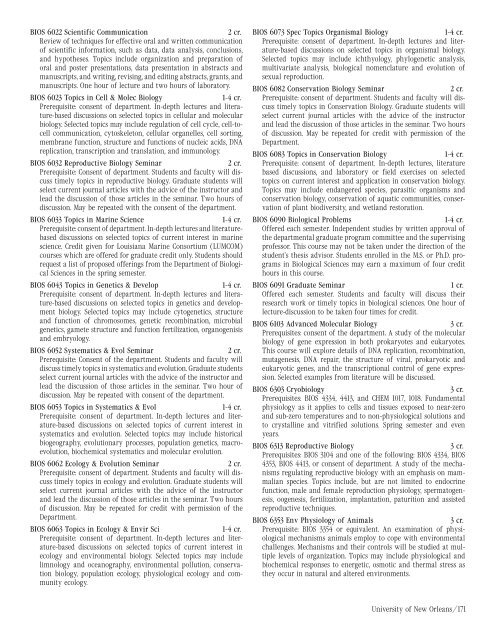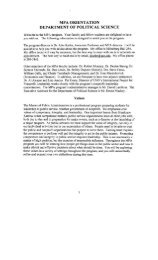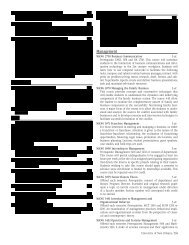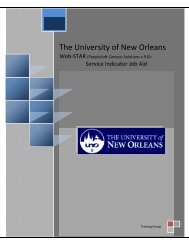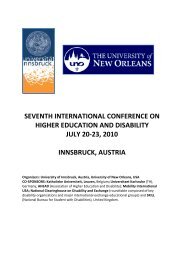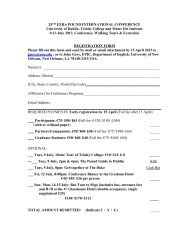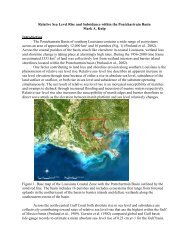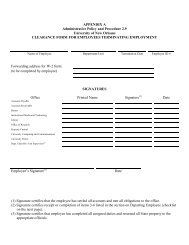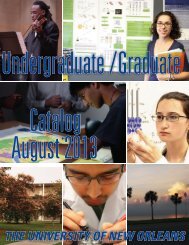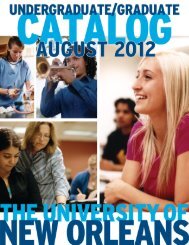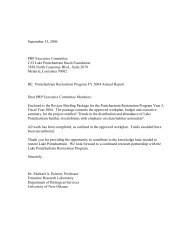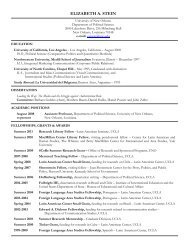Untitled - University of New Orleans
Untitled - University of New Orleans
Untitled - University of New Orleans
You also want an ePaper? Increase the reach of your titles
YUMPU automatically turns print PDFs into web optimized ePapers that Google loves.
BIOS 6022 Scientific Communication<br />
2 cr.<br />
Review <strong>of</strong> techniques for effective oral and written communication<br />
<strong>of</strong> scientific information, such as data, data analysis, conclusions,<br />
and hypotheses. Topics include organization and preparation <strong>of</strong><br />
oral and poster presentations, data presentation in abstracts and<br />
manuscripts, and writing, revising, and editing abstracts, grants, and<br />
manuscripts. One hour <strong>of</strong> lecture and two hours <strong>of</strong> laboratory.<br />
BIOS 6023 Topics in Cell & Molec Biology<br />
1-4 cr.<br />
Prerequisite: consent <strong>of</strong> department. In-depth lectures and literature-based<br />
discussions on selected topics in cellular and molecular<br />
biology. Selected topics may include regulation <strong>of</strong> cell cycle, cell-tocell<br />
communication, cytoskeleton, cellular organelles, cell sorting,<br />
membrane function, structure and functions <strong>of</strong> nucleic acids, DNA<br />
replication, transcription and translation, and immunology.<br />
BIOS 6032 Reproductive Biology Seminar<br />
2 cr.<br />
Prerequisite: Consent <strong>of</strong> department. Students and faculty will discuss<br />
timely topics in reproductive biology. Graduate students will<br />
select current journal articles with the advice <strong>of</strong> the instructor and<br />
lead the discussion <strong>of</strong> those articles in the seminar. Two hours <strong>of</strong><br />
discussion. May be repeated with the consent <strong>of</strong> the department.<br />
BIOS 6033 Topics in Marine Science<br />
1-4 cr.<br />
Prerequisite: consent <strong>of</strong> department. In-depth lectures and literaturebased<br />
discussions on selected topics <strong>of</strong> current interest in marine<br />
science. Credit given for Louisiana Marine Consortium (LUMCOM)<br />
courses which are <strong>of</strong>fered for graduate credit only. Students should<br />
request a list <strong>of</strong> proposed <strong>of</strong>ferings from the Department <strong>of</strong> Biological<br />
Sciences in the spring semester.<br />
BIOS 6043 Topics in Genetics & Develop<br />
1-4 cr.<br />
Prerequisite: consent <strong>of</strong> department. In-depth lectures and literature-based<br />
discussions on selected topics in genetics and development<br />
biology. Selected topics may include cytogenetics, structure<br />
and function <strong>of</strong> chromosomes, genetic recombination, microbial<br />
genetics, gamete structure and function fertilization, organogenisis<br />
and embryology.<br />
BIOS 6052 Systematics & Evol Seminar<br />
2 cr.<br />
Prerequisite: Consent <strong>of</strong> the department. Students and faculty will<br />
discuss timely topics in systematics and evolution. Graduate students<br />
select current journal articles with the advice <strong>of</strong> the instructor and<br />
lead the discussion <strong>of</strong> those articles in the seminar. Two hour <strong>of</strong><br />
discussion. May be repeated with consent <strong>of</strong> the department.<br />
BIOS 6053 Topics in Systematics & Evol<br />
1-4 cr.<br />
Prerequisite: consent <strong>of</strong> department. In-depth lectures and literature-based<br />
discussions on selected topics <strong>of</strong> current interest in<br />
systematics and evolution. Selected topics may include historical<br />
biogeography, evolutionary processes, population genetics, macroevolution,<br />
biochemical systematics and molecular evolution.<br />
BIOS 6062 Ecology & Evolution Seminar<br />
2 cr.<br />
Prerequisite: consent <strong>of</strong> department. Students and faculty will discuss<br />
timely topics in ecology and evolution. Graduate students will<br />
select current journal articles with the advice <strong>of</strong> the instructor<br />
and lead the discussion <strong>of</strong> those articles in the seminar. Two hours<br />
<strong>of</strong> discussion. May be repeated for credit with permission <strong>of</strong> the<br />
Department.<br />
BIOS 6063 Topics in Ecology & Envir Sci<br />
1-4 cr.<br />
Prerequisite: consent <strong>of</strong> department. In-depth lectures and literature-based<br />
discussions on selected topics <strong>of</strong> current interest in<br />
ecology and environmental biology. Selected topics may include<br />
limnology and oceanography, environmental pollution, conservation<br />
biology, population ecology, physiological ecology and community<br />
ecology.<br />
BIOS 6073 Spec Topics Organismal Biology<br />
1-4 cr.<br />
Prerequisite: consent <strong>of</strong> department. In-depth lectures and literature-based<br />
discussions on selected topics in organismal biology.<br />
Selected topics may include ichthyology, phylogenetic analysis,<br />
multivariate analysis, biological nomenclature and evolution <strong>of</strong><br />
sexual reproduction.<br />
BIOS 6082 Conservation Biology Seminar<br />
2 cr.<br />
Prerequisite: consent <strong>of</strong> department. Students and faculty will discuss<br />
timely topics in Conservation Biology. Graduate students will<br />
select current journal articles with the advice <strong>of</strong> the instructor<br />
and lead the discussion <strong>of</strong> those articles in the seminar. Two hours<br />
<strong>of</strong> discussion. May be repeated for credit with permission <strong>of</strong> the<br />
Department.<br />
BIOS 6083 Topics in Conservation Biology<br />
1-4 cr.<br />
Prerequisite: consent <strong>of</strong> department. In-depth lectures, literature<br />
based discussions, and laboratory or field exercises on selected<br />
topics on current interest and application in conservation biology.<br />
Topics may include endangered species, parasitic organisms and<br />
conservation biology, conservation <strong>of</strong> aquatic communities, conservation<br />
<strong>of</strong> plant biodiversity, and wetland restoration.<br />
BIOS 6090 Biological Problems<br />
1-4 cr.<br />
Offered each semester. Independent studies by written approval <strong>of</strong><br />
the departmental graduate program committee and the supervising<br />
pr<strong>of</strong>essor. This course may not be taken under the direction <strong>of</strong> the<br />
student’s thesis advisor. Students enrolled in the M.S. or Ph.D. programs<br />
in Biological Sciences may earn a maximum <strong>of</strong> four credit<br />
hours in this course.<br />
BIOS 6091 Graduate Seminar<br />
1 cr.<br />
Offered each semester. Students and faculty will discuss their<br />
research work or timely topics in biological sciences. One hour <strong>of</strong><br />
lecture-discussion to be taken four times for credit.<br />
BIOS 6103 Advanced Molecular Biology<br />
3 cr.<br />
Prerequisites: consent <strong>of</strong> the department. A study <strong>of</strong> the molecular<br />
biology <strong>of</strong> gene expression in both prokaryotes and eukaryotes.<br />
This course will explore details <strong>of</strong> DNA replication, recombination,<br />
mutagenesis, DNA repair, the structure <strong>of</strong> viral, prokaryotic and<br />
eukaryotic genes, and the transcriptional control <strong>of</strong> gene expression.<br />
Selected examples from literature will be discussed.<br />
BIOS 6303 Cryobiology<br />
3 cr.<br />
Prerequisites: BIOS 4334, 4413, and CHEM 1017, 1018. Fundamental<br />
physiology as it applies to cells and tissues exposed to near-zero<br />
and sub-zero temperatures and to non-physiological solutions and<br />
to crystalline and vitrified solutions. Spring semester and even<br />
years.<br />
BIOS 6313 Reproductive Biology<br />
3 cr.<br />
Prerequisites: BIOS 3104 and one <strong>of</strong> the following: BIOS 4334, BIOS<br />
4353, BIOS 4413, or consent <strong>of</strong> department. A study <strong>of</strong> the mechanisms<br />
regulating reproductive biology with an emphasis on mammalian<br />
species. Topics include, but are not limited to endocrine<br />
function, male and female reproduction physiology, spermatogenesis,<br />
oogenesis, fertilization, implantation, paturition and assisted<br />
reproductive techniques.<br />
BIOS 6353 Env Physiology <strong>of</strong> Animals<br />
3 cr.<br />
Prerequisite: BIOS 3354 or equivalent. An examination <strong>of</strong> physiological<br />
mechanisms animals employ to cope with environmental<br />
challenges. Mechanisms and their controls will be studied at multiple<br />
levels <strong>of</strong> organization. Topics may include physiological and<br />
biochemical responses to energetic, osmotic and thermal stress as<br />
they occur in natural and altered environments.<br />
<strong>University</strong> <strong>of</strong> <strong>New</strong> <strong>Orleans</strong>/171


